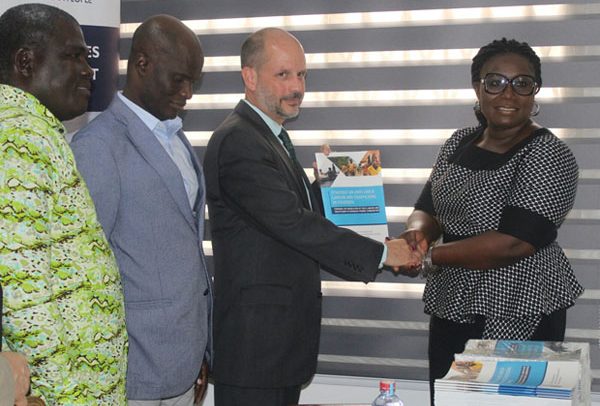Christopher J. Lamora exchanging the signed strategy with Elizabeth Naa Afoley Quaye
The Ministry of Fisheries and Aquaculture Development (MOFAD) and the United States through the U.S. Agency for International Development (USAID) has officially signed the fisheries sector’s new Anti-Child labour and Trafficking (Anti-CLaT) Strategy.
The Anti-CLaT strategy outlines plans to reduce and eventually eliminate child labour and trafficking in the fisheries sector through designed approaches for effective protection of children and prosecution of offences relating to child labour and trafficking in cooperation with other ministries and the police.
Charge d’ Affairs of the US Embassy in Ghana, Christopher J. Lamora noted the importance of the signing ceremony attributing it to the commitment of government towards the child labour fight.
He said the country’s fishing industry is deeply entrenched with child labour and trafficking hence the strategy to address the issue.
He therefore stated that the newly adopted strategy “bolsters the Government of Ghana’s commitment to fight child labour and trafficking and highlights our cooperation to eliminate all forms of child labour and human trafficking.”
MOFAD Minister, Elizabeth Naa Afoley Quaye, in her remarks, indicated that the Anti-CLaT Strategy represents a consensus of stakeholders’ views on how to comprehensively combat child trafficking in the fisheries sector.
She explained that the Ghana’s fisheries sector was faced with the challenge of depleting stock which has compelled some fishermen to resort to other means like illegal fishing practices, over-exploitation of the fish stocks as well as child exploitation for fishing.
“In Ghana, over 50,000 children believed to be trafficked annually get involved in fishing in our inland bodies, particularly along the Volta Lake, “she added.
She stressed: “Child Labour and Trafficking is illegal and contravenes the laws of Ghana as it infringes on the rights of the child, and it affects children’s physical and mental health; it has significant implications”.
By Jamila Akweley Okertchiri


